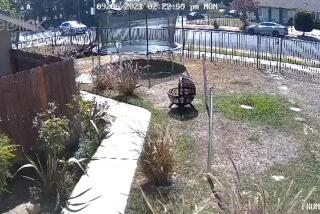It’s hard, When Making the Right Choice Comes Out of Your Pocketbook : Cheating the insurance company on a car repair bill seemed minor. But then the schoolteacher recalled teaching students a lesson on morality and ethics.
- Share via
The papers are full of insurance scams costing millions of dollars, so we decide that since we’re paying the premiums we’re going to get as much out of the system as we can. We fail, however, to connect our personal “small” frauds to the overall moral decline in our community.
Today I made the connection. I would be several hundred dollars richer if I hadn’t.
I was visiting auto body shops to get estimates on repairing a dent that my elderly Cadillac had acquired when I lost a bout with a steel post. So far the best price, in Glendale, approached $1,500.
Then I stopped at a shop in the East Valley, surrounded by auto junk yards, which specializes in Cadillacs. I tried to look as much like a schoolteacher as possible. It wasn’t hard since I am a schoolteacher.
The owner surveyed my car, asked about other nicks and dings, then told me how we could both profit.
He could convince the insurance company that my accident had caused other damage, including the loss of a side mirror. He would simply remove the existing mirror and substitute a broken one. He would claim I had hit a big pole, not the dinky one I’d actually hit. He would proclaim my hubcaps damaged.
With a little luck, he assured me, the insurance company would pay more than $3,000. He would take the money, for which he would repair the dent, give the car a Cadillac quality paint job and replace my old canvas top. I was not to talk to the claims adjuster. He’d take care of it all. Not to worry.
Ah, the devil in coveralls. I could hardly suppress my excitement. For my $500 deductible, I could have one conspicuously new fender. For just saying yes, I could have a paint job and a snazzy top on my ’86 Eldorado. Was this too good to be true, or what?
Then I remembered Pete.
I’m a high school English teacher. Prompted by the literature my class reads, I sometimes lead a discussion of morals and ethics. I try to help students examine the choices they make, and will make, and understand how those choices affect themselves and others.
Last semester, Pete, as I’ll call him, came to class wearing a neck brace. He’d been rear-ended on his way to school the day before. “Are you hurt?” I asked.
No, he said, his attorney had given him the collar to wear so he could collect insurance money.
I did a quick class survey. How many had auto insurance? Did they think the rates were fair? Why were they so high?
We talked about fraud and what it costs all of us. It didn’t take the students long to figure out that we were the ones who would be paying for Pete’s phony injury. Pete sank into his seat. “I need the money for the prom,” he whined. We don’t want to pay for it, his classmates replied.
Now here I was, confronting the reality of my own pocketbook. Abstract discussions and abstract moral choices are easy. Solving other people’s dilemmas is easy. It had been easy to brush aside Pete’s need for prom money.
This one was hard.
But spoiling my daydreams, there was Jiminy Cricket sitting on my shoulder--only he had Pete’s face and the face of every other student I’ve ever taught.
How could I lead a class discussion on morality and ethics knowing I had left mine behind when I locked up the classroom for the summer?
Even then I left open the possibility of cheating. I didn’t tell off the garage man. I said I would go home and call the insurance company--which I did, but I got the car fixed in Glendale.
My next lesson in ethics won’t be as abstract as they have been in the past. I’ll confess how I sinned in my heart. I’ll explore how ambiguous the reward of doing the right thing is if it comes with a bill for $1,500.
But I’ll also describe how good it feels not to wonder if I’ll get caught.






